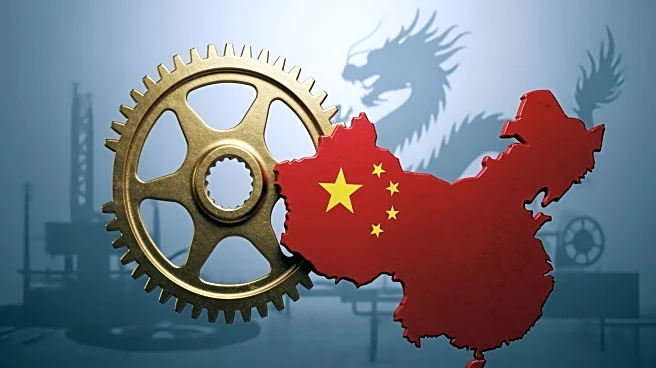What's Happening?
China has imposed sanctions on five U.S.-linked affiliates of South Korean shipbuilder Hanwha Ocean, a move seen as a warning gesture amid ongoing trade tensions with the United States. The sanctions were
announced as the U.S. and China began charging additional port fees targeting each other's vessels. This development comes ahead of a scheduled meeting between President Trump and Chinese leader Xi Jinping to address the prolonged trade war. The sanctions target Hanwha Ocean's affiliates involved in U.S. government investigative activities, although specifics were not provided. Despite the sanctions, Hanwha's affiliates have no direct business connections with China, minimizing immediate impact.
Why It's Important?
The sanctions highlight the escalating trade conflict between the U.S. and China, which could have broader implications for global trade and the shipbuilding industry. South Korea's shipbuilding sector, the world's second-largest, plays a crucial role in steel exports and engine imports, making it a significant player in the global economy. The sanctions could potentially affect investor sentiment and lead to delays in commercial vessel orders, while also sparking increased demand for naval ships worldwide. The situation underscores the interconnectedness of global industries and the potential ripple effects of geopolitical tensions.
What's Next?
The upcoming meeting between President Trump and Xi Jinping may provide a platform for resolving some of the trade tensions. However, the possibility of expanded sanctions remains a concern for investors and industry stakeholders. South Korea's pledge to support the U.S. shipbuilding industry could further complicate relations with China. Analysts suggest that while the sanctions may not have immediate effects, they could influence future trade dynamics and strategic decisions within the shipbuilding sector.
Beyond the Headlines
The sanctions raise questions about the ethical and legal dimensions of international trade practices and the use of economic measures as political tools. The reliance on South Korean shipbuilders for steel and engine imports highlights the complexities of global supply chains and the potential vulnerabilities in international trade relations.












